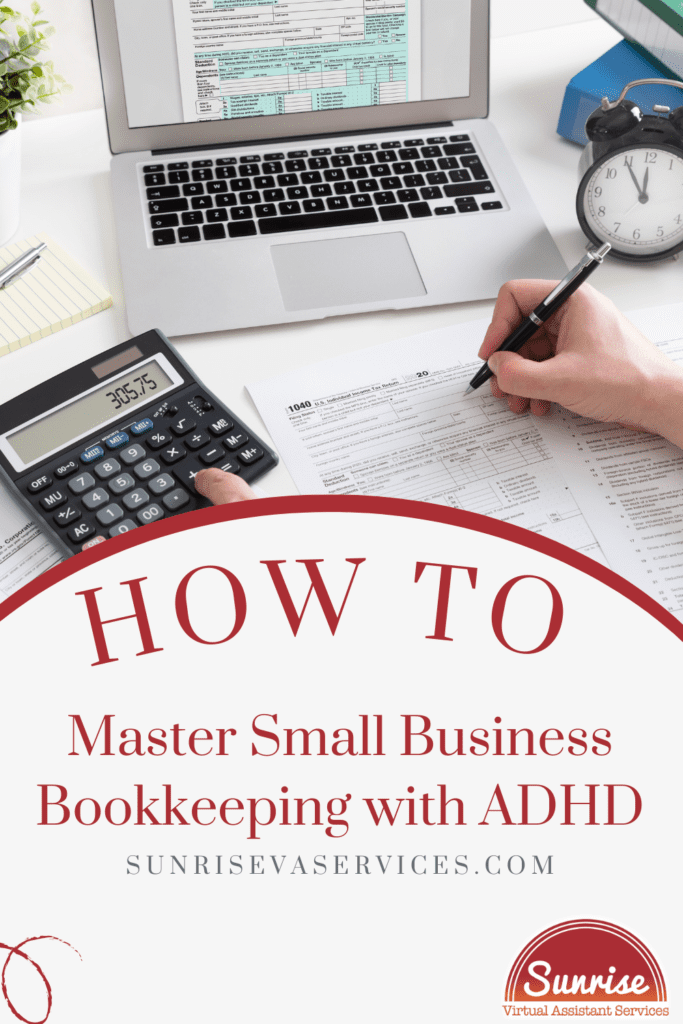Bookkeeping is a necessary element of every business that ever existed. Managing small business bookkeeping can be challenging for anyone, but for small business owners with ADHD, maintaining the financial records of your business can be even more difficult at times.
Bookkeeping involves:
- Maintaining precise records.
- Paying close attention to detail.
- Sticking to a routine,
These are all necessary actions requiring skills that may be tough for someone with a particular flavor of neurodiversity, especially if you have a poor track record when it comes to organization.
But you absolutely can manage your own business bookkeeping, so don’t give up just yet! Mastering small business bookkeeping isn’t rocket science, and you don’t have to be a math genius or a superorganized person to do it.
Let’s explore how you can conquer bookkeeping while managing ADHD, ensuring your business thrives and you succeed!
Understanding the Challenges
Before diving into solutions, let’s take a moment to acknowledge the common challenges that small business owners face, especially those with ADHD.
We all know that running a small business comes with its fair share of hurdles. Still, for those with attention deficit hyperactivity disorder, these challenges can feel even more intense.
However, this article specifically focuses on that particular group, shedding light on how ADHD can uniquely impact your journey as a business owner.
Let’s look at the most common bookkeeping challenges that can cause the most headaches.
Common Bookkeeping Challenges as a Neurodivergent Business Owner
- Difficulty Maintaining Focus: Get lost in the sauce often? Tasks like data entry and reviewing financial documents can be time-consuming and monotonous.
- Organizational Challenges: Need help keeping up with things? Misplaced receipts and invoices can lead to incomplete financial records.
- Time Management Issues: Did you forget to file that report? Missed deadlines for filing taxes or submitting financial reports are common.
- Impulsivity: Tend to act first, and ask questions later? Quick decisions without thorough consideration can affect financial stability.
- Overwhelm from Multitasking: Feeling anxious? Handling multiple bookkeeping tasks simultaneously can lead to errors and burnout.
Implementing Effective Coping Strategies
You can do anything you put your mind to; yes, this thought process extends to even the most nuanced aspects of business, like the financial department.
For many small business owners with ADHD, handling bookkeeping can initially feel overwhelming, but is still a worthwhile pursuit. Don’t let your ADHD symptoms hold you back from your goals!
Taking charge of your own bookkeeping isn’t just about maintaining records; it’s an empowering journey of gaining an understanding (if not total mastery) of an essential part of your business.
Let’s dive deeper into some effective coping strategies that can assist small business owners with ADHD in managing their bookkeeping challenges. And if you want more small business tips, you can check out these simple bookkeeping mistakes to avoid.
Here are some small business accounting and bookkeeping tips that can make a real difference: From utilizing digital tools for better tracking to setting aside dedicated time for financial tasks, these approaches can help streamline your bookkeeping process and reduce overwhelm.
1. Structured Routines for Bookkeeping
Creating a structured daily routine is crucial for ADHD individuals. Dedicate specific time blocks for bookkeeping tasks. Routines help establish that bookkeeping is a regular part of your day, and you will handle these tasks accordingly.
Use a calendar to block off time for tasks like updating your balance sheet or reviewing financial statements, and remember to schedule regular breaks to maintain focus.
2. Leveraging Digital Tools
These days, there are countless tools and apps designed to make bookkeeping easier. You can use bookkeeping software like QuickBooks Online or Microsoft Excel to easily organize your financial data.
These programs can help you track business transactions, expenses, and bank reconciliation. Plus, they often have mobile apps so you can manage your books on the go.
3. Setting Reminders for Important Deadlines
Forgetfulness is a common trait among those of us with ADHD. Use your phone or computer to set reminders or alerts for key financial deadlines, such as tax time or filing your cash flow statement.
This simple step can help mitigate the risk of missing deadlines and incurring tax penalties!
4. Breaking Down Bookkeeping Tasks
Take it easy! Bookkeeping tasks can seem overwhelming, especially when you’re trying to tackle them all at once. Break these tasks into smaller, more manageable segments.
For example, dedicate one session to recording only financial transactions and another to organizing your chart of accounts. This way, you can work within your attention span limitations and reduce that awful feeling of being overwhelmed.
5. Practicing Mindfulness
Incorporating mindfulness techniques can effectively address impulsivity and enhance decision-making. Before making any financial decisions, take a moment to center yourself by taking a few deep breaths.
It’s important to carefully assess the long-term implications of your choices on your business’s financial well-being. Integrating mindfulness before major decisions can deter impulsive actions that could potentially jeopardize your company’s finances.
Outsourcing Bookkeeping
You don’t always need to hire a full-time bookkeeper just to take the burden off your shoulders. Why not outsource your bookkeeping tasks to a virtual assistant, professional bookkeeper, or an online bookkeeping service? It’s cost efficient, and saves you a ton of time and energy!
A certified public accountant or a virtual assistant service with a dedicated bookkeeper option can handle complex tasks like double-entry bookkeeping and tax planning. Outsourcing allows you to focus on other important aspects of your business operations while ensuring accurate financial records.
If you were wondering, yes, we offer bookkeeping services!
Seeking Support from the ADHD Community
Connect with other small business owners in the ADHD community. Joining support groups or consulting with a mentor can provide valuable insights and coping strategies. Sharing experiences with people who understand precisely what you’re going through can be incredibly empowering.
More Small Business Bookkeeping Tips
By implementing these strategies, small business owners with ADHD can turn bookkeeping from a daunting task into a manageable and even rewarding aspect of running a business. Here are some additional tips to help you succeed:
- Stay Consistent: Consistency is key to good bookkeeping. Stick to your structured routine and make bookkeeping a regular habit.
- Use Separate Accounts: Keep your business bank account separate from your personal finances to simplify bookkeeping tasks and ensure accuracy.
- Review Financial Statements Regularly: Regularly reviewing financial reports like the income statement and balance sheet helps you keep abreast of your business’s financial performance.
- Take Advantage of Tax Deductions: Be aware of potential tax deductions for small businesses, and keep detailed records to maximize your savings.
- Monitor Cash Flow: Use your cash flow statement to track how much money is coming in and going out, helping you make informed financial decisions.
Conclusion
Mastering small business bookkeeping with ADHD is undoubtedly challenging, but it becomes an achievable goal with the right strategies. You can manage your business’s financial activities by setting up a structured routine, leveraging digital tools, and breaking down tasks. Remember, you’re not alone on this journey; consider outsourcing complex tasks to professionals and finding neurodivergent support groups.
Ultimately, your business’s financial health is crucial to its success. By taking control of your bookkeeping, you’re setting the stage for growth and prosperity. And if you find yourself needing additional help, don’t hesitate to contact Sunrise Virtual Assistant Services for expert bookkeeping assistance. With the right support, you can focus on what you do best—running and growing a successful business.
Take the first step today toward mastering your small business bookkeeping! These strategies can significantly enhance organization and efficiency, ultimately leading to improved financial management.


